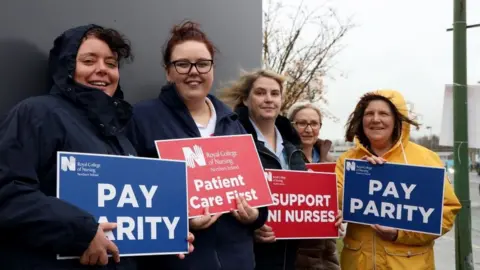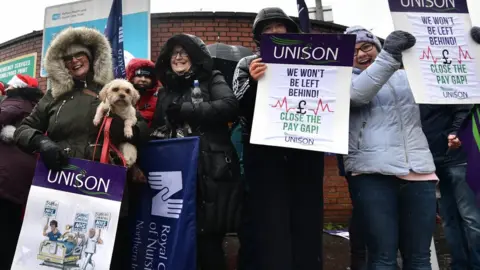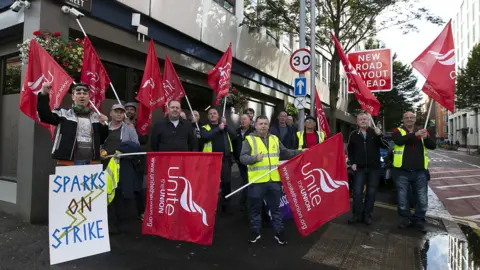Cost of living: How will you be affected by pre-Christmas strikes?
 Pacemaker
PacemakerThe festive season in Northern Ireland will be dominated by images of walk-outs, picket lines and disruption to services.
As the cost-of-living crisis grows, with rising energy costs and inflation, many workers have felt the pinch as the UK enters a recession.
BBC News NI has examined the reasons for the industrial action campaigns and what impact there is likely to be on services in the run-up to Christmas.
Why are health workers striking now?
For many trade unions, there are historic issues at play, as well as the current difficulties with the cost of living.
Many public sector workers, for instance, have had no or minimal pay increases over the past decade. Some, too, believe their efforts during the pandemic should have had greater recognition.
For much of that time, interest rates, affecting mortgages and other borrowing costs, had remained at low levels, but these have increased in response to inflation - the rate of price increases over a period of time - as everyday goods push prices up.
Inflation was 11.1% in October, a percentage point higher than the previous month.
Energy costs, such as oil and gas, have been a key factor in this, with the war in Ukraine adding pressure to supply lines.
Despite some government support, many workers have felt now is the time to take a stand and demand better pay and conditions.
What form will the industrial action take?
On 5 December, Unison and Nipsa, two of Northern Ireland's largest trade unions, began action short of strike, which means workers sticking to their contracted hours and duties.
This involves ensuring they take breaks and not staying late unpaid.
The unions will also take part in a one-day strike on 12 December.
Until 8 December, health workers had not received a pay offer until the Department of Health said it would implement the recommendation of a pay review body for a £1,400 uplift.
The Royal College of Nursing (RCN), which previously took strike action for the first time in its history in Northern Ireland in 2019, has campaigned for a pay rise of 5% above the retail price index rate of inflation.
They have planned to take strike action on 15 and 20 December between 08:00 and 20:00 GMT.
How will this affect hospital appointments?
Routine services are likely to be the most affected by the industrial action, much of which is facing a backlog with patients waiting many months for some appointments.
The industrial action has the potential to add to this, although unions have said their action is also to highlight issues about short staffing,
Under trade union laws, life-preserving care must be provided during strikes by health workers.
 Pacemaker
PacemakerThis is likely to mean urgent tests and scans, essential cancer services and ongoing care for vulnerable patients will be protected.
Emergency care and intensive care will also be safeguarded.
BT call handlers for 999 services, based in County Armagh, have also taken part in recent strike action.
In October, the company redeployed staff to cover the service.
Who else is striking?
Royal Mail workers have held a number of strikes across the UK with further action scheduled for 9, 11, 14, 15, 23 and 24 December.
The company said it had "well-developed contingency plans" but could not fully replace the work of frontline staff.
They have said they will aim to deliver as many parcels and special delivery letters as possible, while priority will be given to prescriptions and Covid-19 test kits.
The University and College Union has also taken action in November, after taking ballots on pay, working conditions and pension cuts.
Maintenance workers at the Northern Ireland Housing Executive have been engaged in strike action too, with about 300 Unite members involved.
 Pacemaker
PacemakerDuring this, emergency-only repairs have been carried out in affected areas.
A number of teaching unions in Northern Ireland have been balloted on strike action after a pay offer was rejected earlier this year.
What can Stormont do about the strikes?
With no agreed pay policy in the absence of an executive, public sector workers had not been offered a pay award for 2022/23.
However, after legislation was passed at Westminster, senior civil servants are now empowered to engage with trade unions and make pay awards.
The Department of Finance has urged officials to ensure the awards are affordable in the context of a limited Stormont budget.
The department's guidance asked civil servants to consider legal entitlements, fairness and national pay arrangements in their negotiations.
